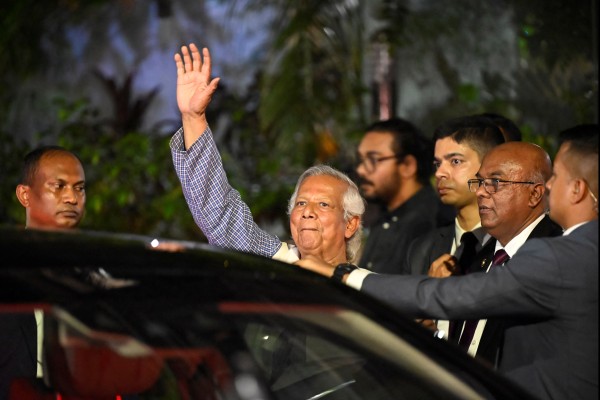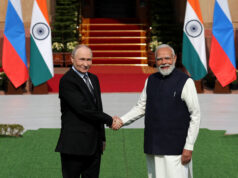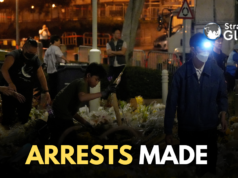
Former Prime Minister Sheikh Hasina must be returned to Bangladesh from India to face trial, and until that happens, she should stay quiet, insists the Chief Adviser of Bangladesh’s interim government, Prof Muhammad Yunus.
In an interview released by the Press Trust of India on Thursday, Prof Yunus warned that there was ‘discomfort’ in Bangladesh over Hasina’s remarks from India, and that this had been “firmly” conveyed to New Delhi.
In his interview, Dr Yunus said “We have said quite firmly that she should keep quiet. This is an unfriendly gesture towards us; she has been given shelter there, and she is campaigning from there. It is not that she has gone there on a normal course. She has fled following a people’s uprising and public anger.”
While Bangladesh values strong ties with India, New Delhi must move “beyond the narrative that portrays every other political party except Awami League as Islamist,” he said.
“The way forward is for India to come out of the narrative. The narrative is that everybody is Islamist, the Bangladesh Nationalist Party (BNP) is Islamist, and everyone else is Islamist and will make this country into Afghanistan. And Bangladesh is in safe hands with Sheikh Hasina at the helm only. India is captivated by this narrative. India needs to come out of this narrative. Bangladesh, like any other nation, is another neighbour,” he said.
But it is a neighbour going through some troubled times, as hardcore Islamists freed by the Yunus regime seek to re-establish their power, and the opposition BNP activists continue with acts of revenge and retribution against Awami league workers and supporters.
On Wednesday, a mob stormed the office of Khulna Metropolitan Police (KMP) deputy commissioner in Sonadanga and beat up a 16-year-old boy, accusing him of defaming the Prophet.
Bangladesh’s GenZ jihadis killed Utsob Mondal, a Hindu student, in Khulna last night in front of police and army. Utsob Mondal criticised Muhammad on facebook, so crazy Islamic terrorists brutally killed him. Police and army did nothing to save Utsob. pic.twitter.com/rIJGktBtjM
— taslima nasreen (@taslimanasreen) September 5, 2024
While there were several reports that the boy had died, Prothom Alo, a prominent Bangladeshi newspaper, quoted the Inter-Services Public Relations (ISPR) as saying that the teenager was rescued from the mob by the army, and was undergoing treatment at a hospital. Several army members sustained injuries while rescuing him, it said.
Prothom Alo also reported that on the same day, the homes of two lawmakers in Khulna, who are cousins of Sheikh Hasina, was vandalised by Students Against Discrimination, a body not seen as affiliated to any political party.
Disinformation continues to muddy the real situation on the ground. But some reports say that like the ‘resignations’ by the top brass of the election commission Thursday, there is a systematic ongoing purge of anyone known to have links with the Awami League.
· “All Vice Chancellors, Pro-VCs, even treasurers of various universities, as well as 175 school headmasters, have been forced to resign..
· Parliament was dissolved illegally
· All Supreme Court judges and many High Court judges including the Chief Justice and Attorney General were forcibly removed
· Bangladesh Bank Governor and deputy governors removed
· Board of Directors of all banks, financial institutions forcibly changed, leading to total chaos in the financial sector
· 33 permanent secretaries and 11 Ambassadors arbitrarily removed
· Nearly 300 new secretaries/additional secretaries/joint secretaries and hundreds of police commissioners appointed without any due process. Two former IGPs arrested.
· Over 180 cases filed involving over 200,000 Awami Leaders and activists, most of whom have gone into hiding fearing for their lives.
· All criminal cases against BNP and Bangladesh Jamaat-e-Islami activists, as well as Dr Yunus’ conviction over non-payment of taxes, have been overturned or withdrawn without due process of law.
· Media is strictly controlled. Eight private TV channels have been closed and many editors and reporters are under detention
· Schools and colleges are not functioning: all SSC and HSC students got auto-promotion. No one has to take any test or exam.
A former government official trashed the report as “pure lies” released by the Awami League, while an activist said many of the points raised, including attacks on minorities, were ‘valid.’ However, she said it was important to note that the real reason for these attacks might be “more economical than religious.”
Referring to the New Delhi flagging recent incidents of attacks on Hindu minorities in Bangladesh, Yunus said this is just an “excuse”. According to him, “The issue of trying to portray the conditions of minorities in such a big way is just an excuse.”
Insisting that “We need to work together to improve this relationship, which is now at a low,” he went on to clarify that there were demands for revisiting certain treaties such as transit and the Adani power deal.
“Everybody is saying that it is needed. We will see what is on paper and, second, what is actually happening on the ground. I can’t answer it specifically. If there is any need to review, we will then raise questions about it,” he said.
That may be a matter for later. Right now with the country seemingly rudderless, Yunus’ priorities are to ensure stability and the return of peace.
In a career spanning three decades and counting, Ramananda (Ram to his friends) has been the foreign editor of The Telegraph, Outlook Magazine and the New Indian Express. He helped set up rediff.com’s editorial operations in San Jose and New York, helmed sify.com, and was the founder editor of India.com.
His work has featured in national and international publications like the Al Jazeera Centre for Studies, Global Times and Ashahi Shimbun. But his one constant over all these years, he says, has been the attempt to understand rising India’s place in the world.
He can rustle up a mean salad, his oil-less pepper chicken is to die for, and all it takes is some beer and rhythm and blues to rock his soul.
Talk to him about foreign and strategic affairs, media, South Asia, China, and of course India.




